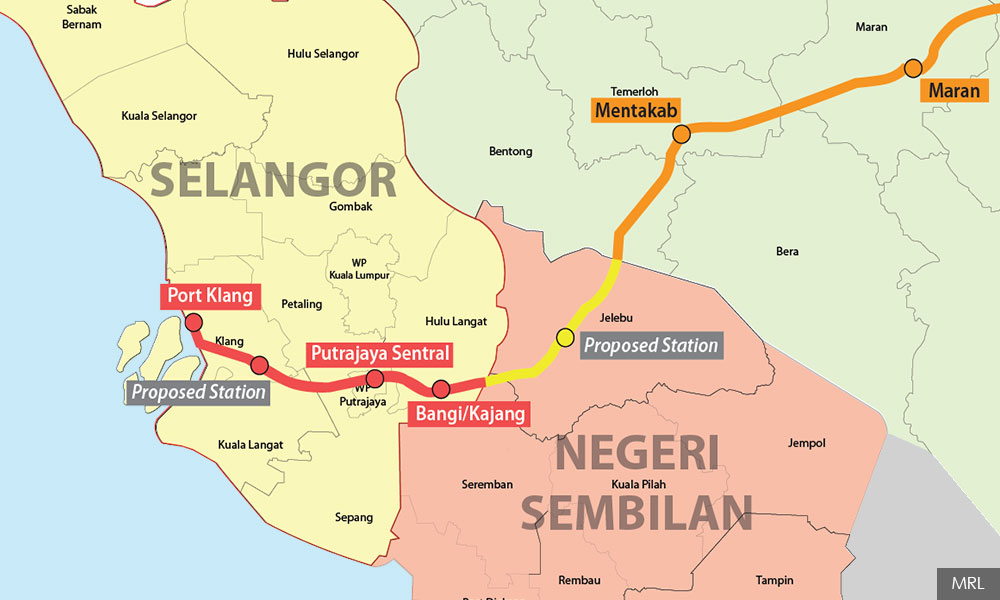
QUESTION TIME | The chief negotiator for the RM44 billion East Coast Rail Link or ECRL, Daim Zainuddin, had some interesting things to say about the newly renegotiated deal with China, of which the chief one is that the ECRL would be loss-making for a “considerable period” after its completion in 2026.
However, in an interview with the South China Morning Post, he did not specify the length of the period that the ECRL would bleed red ink, but instead justified the decision to go ahead with the deal because of legal obligations to uphold the previous deal.
Daim even challenged those who criticised the deal to come out in the open. “Those who criticise, put it in writing and send it to the government. Come out in the open,” he said. “Don’t criticise. Some people say, why don’t you walk away from the agreement. You don’t have to pay one cent. Do they know the agreement or not?”
He added: “There is a binding agreement … it may be one-sided, but it is equally binding (on Malaysia). You can’t blame the Chinese. If you are silly enough to sign the agreement, then it’s your problem.”
Let’s deal with this point first, before we go on to others raised by Daim in the interview and project owner government-owned Malaysia Rail Link (MRL) in its article.

We presume a contract has been signed and the relevant law that prevails, in this case, is the Malaysian law on contracts - Daim does not say otherwise in the interview. That would be the Contracts Act.
The Act under “Voidability of agreements without free consent” Section 19 (1) says: “When consent to an agreement is caused by coercion, fraud, or misrepresentation, the agreement is a contract voidable at the option of the party whose consent was so caused.”
Senior lawyers I have spoken to indicate that because there were serious elements of fraud involved in the ECRL deal, with both Prime Minister Dr Mahathir Mohamad and Finance Minister Lim Guan Eng indicating there was fraud, the contract could be terminated without any penalty.
There was some RM30 billion of contract overpricing with China firms, which were to have filled that RM30 billion hole in 1MDB and conceal the theft that took place there. Some RM20 billion involved the ECRL contract and some RM10 billion involved a pipeline contract.
I said in this column: “So bad is the deal for Malaysia that one wonders how the negotiators could have agreed to such terms knowing full well that China participated in a well-orchestrated plan to rob our country of some RM30 billion to pay for that huge hole of a corresponding amount in 1MDB caused by theft.”
The burden of proof, if the contract dispute goes to court, is based on balance of probabilities, legal sources say, which is less onerous than “beyond reasonable doubt” for criminal cases. Considering that there is likely to be enough evidence to point to fraud, Malaysia would have a good chance of winning the legal case.

Asked what China was anxious about during the negotiations, Daim said in the interview: “I mean this is (a belt and road project). If you break it, it will make international news. And America, a few other countries are watching. They will cheer us, but the damage will not be for them. So we have to be careful.”
However, he failed to explain exactly how damaging it will be and what kind of harm will come to Malaysia if they did not go ahead with the project. In this context, Malaysia Rail Link, in an article in Malaysiakini, said that a penalty of RM21.78 billion would have to be paid in the event of termination.
The article, which referred to a column I had written, said that it did not consider the earlier overpricing of some RM21.5 billion in the negotiations. I had said that there was some RM20 billion in overpricing in ECRL itself, and a further RM10 billion involving pipeline projects. Unless RM30 billion is recovered, then the deal does not recover the money lost through corruption.
Also, a further RM10 billion in saving was obtained by realignment and the scrapping of a tunnel, according to reports. Therefore the full “saving” was RM10 billion, and not RM20 billion as reported. That leaves RM20 billion, out of overpricing of RM30 billion, which is yet to be “recovered”, I added.
In its article MRL further said: “With regards to a new feasibility study and environmental impact assessment report that was mentioned in the opinion piece, MRL would like to highlight that the renegotiations were conducted on the premise that the original EPCC (engineering, procurement, construction and commissioning) agreement was still in place. In short, it was not a negotiating process to reach a new EPCC agreement, but to facilitate the resumption of the ECRL via the supplementary agreement that was inked on April 12, 2019, in Beijing.”
That is shocking. In effect, it means that the issue of overpricing of the ECRL and of the pipeline to nowhere, both totalling some RM30 billion, was never even discussed during the negotiations. What happened to this overpricing element, which was going to fill an RM30 billion hole in 1MDB? Where is the money? Will we ever get it back?

Also, there was no new contract over the ECRL, only a supplementary contract which presumably resulted only from trimming the features of the ECRL because the MRL maintains: “Hence, it is noteworthy to mention that neither the government nor MRL have claimed that the savings of RM21.5 billion for the improved ECRL project were purely from the element of “overpricing,” as suggested by the columnist. In fact, this was not the basis of the negotiations with Beijing at all.”
So there is nothing to crow about the RM21.5 billion cost reduction because it came from trimming features of the contract and realignment, with the original contract remaining intact.
Finally, remember that Lim Guan Eng said that of the RM20 billion advanced, about RM10 billion could be redeemed if the infrastructure project was cancelled. “It should be noted that an advance bond can be redeemed by MRL if the project is terminated. In other words, if the worst case scenario should arise, the government can recover RM10.02 billion.”
The immediate cash loss from contract voiding is RM10 billion, and even that could be recovered if Malaysia repudiated the contract and went for legal settlement as some senior lawyers have suggested to me.
Why build a railway we don’t need which, at Daim’s own admission, will bleed for a “considerable” period of time, will put us in China’s debt for a long time to the tune of RM37.4 billion and for which no proper feasibility reports have been done when we have a clear way out?
P GUNASEGARAM says big deals are often not what they seem on the surface because they involve big money below the surface. E-mail: t.p.guna@gmail.com. - Mkini



No comments:
Post a Comment
Note: Only a member of this blog may post a comment.